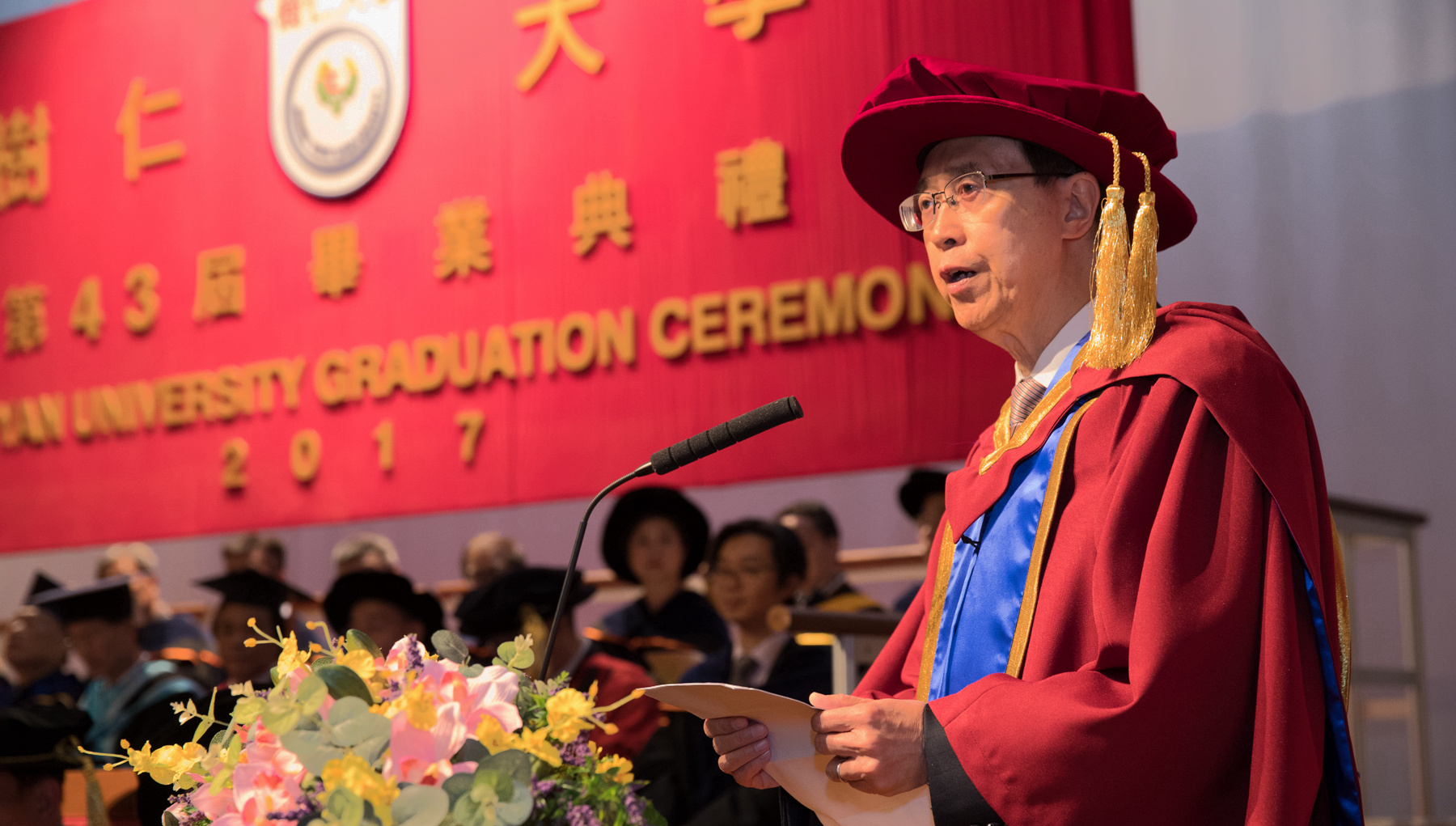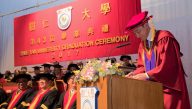香港樹仁大學
第四十三屆畢業典禮
贊辭
陳兆愷法官
榮譽法學博士
以下贊辭由劉康龍博士翻譯
陳兆愷法官畢生致力改善社會,造福社群。身為法官,他公正無私、思維縝密、明察秋毫,同時也是一位謙謙君子。陳法官在司法和公共領域耕耘多年,碩果累累,有幸得以與他共事之諸君均對其成就素為仰慕,奉為楷模。
陳兆愷法官忠誠履行公職,一心為公,令人欽佩。他服務香港,貢獻斐然,亦為樹仁大學做出無私奉獻,令我們深懷感激。對於樹仁大學而言,陳法官並不陌生,他曾多次受邀擔任講座嘉賓。陳法官曾向樹仁大學捐贈五件法袍,展藏於大學圖書館,大家或早已目睹其風采。當被問到為何作此捐贈,陳法官坦言,“法袍有其最佳去處,希望能激勵就讀於樹仁大學的新一代法學學生。”
陳兆愷法官於1948年在香港出生,深具愛國情懷和公共精神,忠誠不渝乃其優秀品質。陳法官在香港接受教育,先後就讀於香港華仁書院和香港大學,1974年獲頒法學學士學位,翌年獲法學專業證書。
回顧早年剛剛入讀香港大學的那段時光,陳法官熱切地談到為了追求夢想,在法律學習上精益求精,需要克服的種種挑戰。憑藉專注的精神和堅韌的衝勁,他很快便精通掌握了法律這門學問。作為一位出色的法律學者,陳兆愷法官後來被一位教授親切地稱為“Lord Denning”(英國大法官丹寧男爵)。雖然此暱稱是對他學習成就一種認可與鼓勵,但讚美之情溢於言表,預示著這個年輕學者的光明未來。
回顧當年初涉職場,陳法官並未直接從事司法工作。他首先擔任見習律師,開啟了自己的法律生涯,這份工作是他日後走上一名優秀事務律師道路的开端。然而,對法律和法庭的憧憬,驅使他另覓蹊徑,砥礪前行。工作數月後,他便放棄實習律師的工作,而師從余叔韶先生,致力實現自己的抱負。從一開始,他的實習大律師導師余叔韶先生便告诉他:“我無法教你法律,你必須自己尋找答案”。因此,陳兆愷很快便顯示出他足智多謀,善於解決問題的过人才能。陳法官回憶道,余先生分享給他最寶貴的智慧便是“開卷有益”。其後十年,陳兆愷的事業一片坦途,蒸蒸日上。余叔韶先生實事求是,以身作則,在其悉心指導下,陳兆愷得到鼎力支持和充分信任,逐漸在法律實踐中形成自己一套嚴謹、系統的方法。
1976年,陳兆愷獲得香港大律師執業資格。他卓絕的專業能力亦享譽海外,2001年他獲英國內殿法學協會頒授名譽監督銜。
上世紀80年代,許多與陳法官共事的大律師,也是他親密的同事,相繼離開香港移居海外。他們也極力勸說陳法官一同離開。再三考慮後,他擔心一旦這群訓練有素的律師離開後,香港的一切將蕩然無存。即使身邊的人都已相繼離開,基於對法治的信念,對香港的忠誠,陳法官堅守了下來。這個決定惠及今天香港社會的各個領域。
1987年,他獲當時的首席按察司(現稱首席法官)羅弼時爵士委任為地方法院法官。此後,他便迅速獲得升遷。1991年至1992年,他擔任最高法院副經歷司;1992年至1997年任高等法院法官;1997年獲委任為高等法院的首席法官,成為首位晉升該職務的本地畢業生;2000年,他獲委任終審法院常任法官;2013年,他擔任終審法院非常任法官。為表彰其對司法的傑出服務,陳法官獲香港大律師公會頒發終身榮譽會員。2013年,他榮獲香港特區政府大紫荊勳章。
陳兆愷法官因實施多項重要措施而聞名,他大力推廣香港法制的雙語應用,推動本港地方法院及高等法院相繼採納中文。在終審法院,對於處理用中文書寫遞交的案件,陳法官的角色舉足輕重。此外,陳法官還發起內地法律學者和司法人員實習計畫。他孜孜不倦,為促進香港和大陸的法律教育貢獻自己的力量。自2013年起,陳法官籌劃課程並親自授課,幫助內地的大學生和研究生研習普通法和香港基本法。截至2017年9月,陳法官一直擔任香港法律教育及培訓常設委員會主席一職。
陳兆愷法官的傑出成就已得到香港高等教育界的廣泛認同。他獲香港大學及香港中文大學頒授榮譽院士銜,亦獲香港城市大學及香港大學頒授榮譽法學博士學位。
陳兆愷法官是一位忠於香港的好公民,是香港社會的棟樑,是引領大家追求正義和公平的典範。副校監,我謹恭請閣下頒授榮譽法學博士學位予陳兆愷法官。
香港樹仁大學
第四十三屆學位頒授典禮
二零一七年十二月十四日
陳兆愷法官謝辭
(以下講辭由劉康龍博士翻譯)
校監、副校長、各位教授、同學、女士們、先生們:
我謹代表本人和劉德華博士,衷心感謝樹仁大學授予我倆榮譽博士學位。今日之贊詞不吝溢美之辭,褒贊揄揚,令我們不勝感激。我們懷著謙卑和忐忑的心情接受這一榮譽:之所以感到謙卑,是因為我們深信其他賢能之士同樣堪配此殊榮。心懷忐忑,則是因為作為樹仁大學一員,我們感到責無旁貸去致力弘揚樹仁大學的光榮傳統,並以獲頒此榮譽的前賢為榜樣,見賢思齊。
今日之畢業盛會見證在座二百多位畢業生獲授榮譽學位,實在令人歡欣鼓舞。此刻應當感謝父母和家人的無私奉獻及鼎力相助;此刻應當感謝大學,還有各位教授在過去數年傳道解惑,諄諄教誨。他們無私奉獻,為你的生活增添姿彩,為你未來的人生打下堅實的基礎,讓你一展自己抱負。對於他們所有人,你們應該心存感激。
僅僅道聲「謝謝」無足掛齒,因為這與表達感激之情迥然不同。每天我們都與很多人道謝,或出於例行習慣,或出於禮貌;但多數時候,我們並未深究其義。對許多人而言,懂得道謝乃文明社會個人應有之素質和修養。然而,撫心自問,有多少次我們是發自肺腑感激別人為我們所做的一切,而真誠地說聲「謝謝」呢?又有多少次,我們真的知恩報德,認真考慮採取積極行動向幫助我們的人表達感激之情呢?
僅僅道聲「謝謝」實在輕而易舉,因其不費吹灰之力。但表達感激之情卻不易,因其需要見諸行動去感謝他人作出的無私奉獻。我們的感恩之舉須真正發自內心,否則一切將顯得毫無意義和價值。然而,感恩往往容易為人們所疏忽。我們總認為人予我取乃理所當然之事,一切收穫都是天經地義而無需殫智竭力、盡己所能去爭取。有時,我們會認為自己所得一切乃與生俱來。在一個日趨富裕的社會裡,福利往往垂手可得,於是人們認為享受福利乃順理成章之事。因此,對許多人而言,感恩已成落伍的概念。目睹此傳統美德日漸式微,實在令人痛心不已。
然而,我們能認定世間萬物皆是理所當然嗎?顯然答案是否定的。世事無常、瞬息萬變,我們卻渾然不覺。我們極少關注周遭發生之事,極少關心萬事萬物皆循其規律而動的道理緣故,以及種種事件又如何影響我們的日常生活。倘若變故未起,一切人事是否依舊?體魄強健的人,只有身患重病,才恍悟健康是福,才會想起對自己無微不至的人表達感激之情。而後,他們便開始怨天尤人。他們不會細想疾病是否起因於自己不良的起居飲食和行為習慣。人們趨利避害,對於那些使社區變得更加安全、更加快樂而默默無聞的工作者,卻從未想起要表達感恩之情。但天有不測之風雲,世事難料,當不幸降臨時,人們卻輕易把責任強加於人,不曾從自己身上找原因。最近一項調查顯示:很多家長都很辛勤工作,不惜推遲自己退休時間,以便為子女提供一切所需,甚至幫助孩子買公寓。但並不是每個人都有幸擁有如此願意奉獻犧牲的父母。此等例子不勝枚舉,許多人為我們提供服務或幫助,我們卻認為理所當然、無動於衷,甚至熟視無睹。因此,當某天我們深陷意外,遇上地鐵故障或交通堵塞時,難道我們不應該去想想那些日以繼夜辛勞為社會服務的人,多一份理解,少一份抱怨呢?我們為什麼不能常懷感恩之心呢?
有些人把自己所擁有的一切視作理所當然,既然所得乃與生俱來,感激他人便無從說起。而事實是,世上根本不存在所謂絕對的權利。畢竟,他人並沒有虧欠我們。就如我們父母一樣,若非出自愛與關心,一旦子女長大成人,他們根本無需再做份外之事來幫助我們。聲稱自己有資格讓父母付出是不合情理的。每項權利都有對等的義務——尊重和維護他人權利的義務。我們擁有何種權利不是問題的癥結,而是我們的行為是否值得別人為我們真心付出。我們應該想想我們享有的十二年免費中小學教育,還有四年大學教育中所獲得的資助。我們應該想想為大學做出慷慨捐贈的善長仁翁。這些例子不計其數。在聲稱有資格得到任何東西之前,我們應該反思自己為社區的所作出的貢獻。我們究竟有否盡了自己的義務?
毫無疑問,我們無法擁有一切,但不能因此心生不忿而責怪他人。我們只能竭盡所能去爭取得償所願。然而,對於那些我們已經遂心如意之事,切記要由衷的心懷感激。
對那些服務和幫助我們的人由衷表達感激極為重要,我們萬不可低估其份量。它有積極的意義。你的感激和讚賞是他們前進的動力,激勵他們躬體力行,卓有成效地工作,最終更好地服務大家。這會使得幫助和服務他人更加暢行無阻。我們的社區會因此變得更和諧、更具建設性、更具前瞻性。
學會欣賞他人,褒揚他們為社會所做的點點滴滴,並由衷的表達感激之情,不僅是一種美德,更是我們品格提升的重要組成部分。因此我們得以瞭解他人所面臨的困境,更能設身處地看待問題,更加寬容地對待彼此。這也有助於拓寬我們的視野和境界,而非過度自我和心存狹隘。我們會因此變得更成熟,更謙虛。當然,我們無法回報自己所得到的一切。事實上,人們在無私幫助他人時甚少考量自己的善舉會否得到回報。但我們可以向榜樣看齊,樂於助人,以同樣的精神服務社會。我冒昧地說,這是表達我們感激之情的最佳途徑。作為富有責任感的畢業生,這也是大學對你們提出的殷切期望。這亦是劉德華博士和我決心努力的方向,以表達我們獲大學頒授此榮銜的感激之情。
謝謝大家。
HONG KONG SHUE YAN UNIVERSITY
The 43rd Graduation Ceremony
Citation
The Honourable Mr. Justice Patrick CHAN Siu Oi, GBM
Doctor of Laws, honoris causa
A citation written and delivered by Dr. Claire WILSON
The Honourable Mr. Justice Patrick CHAN has dedicated his life to the amelioration of our society. He is a judge and gentleman of impeccable neutrality, intellectual rigour, and sound judgement. Those fortunate enough to have shared time with Justice CHAN, on a social or professional level, are often humbled by his achievements and inspired by his example.
Our appreciation of Justice CHAN’s public duties is accompanied by our personal gratitude, as we honour a man who has contributed so much both to Hong Kong, and to our university. Having presented guest lectures here on many occasions Justice CHAN is no stranger to Shue Yan. No doubt you will have had the opportunity to admire five of Justice CHAN’s judicial robes, displayed here on our campus. When asked why he made the donations, Justice CHAN responded candidly that “the best purpose to which he could put these robes was as an inspiration to future law students at Shue Yan University.”
One of Justice CHAN’s most remarkable qualities is loyalty. He was born in Hong Kong in 1948, and his patriotism and public spirit have never faltered. He was educated locally, first at Wah Yan College, and later at the University of Hong Kong, where he was awarded a Bachelor of Laws Degree in 1974, and a Postgraduate Certificate in Laws in 1975.
When recalling his early days as a freshman at Hong Kong University, Justice CHAN has spoken earnestly about the challenges that he needed to overcome in his quest to become more proficient in his legal studies. By executing a dedicated and determined approach he soon mastered the task in hand. Indeed, Patrick CHAN excelled as a legal scholar, and was later affectionately referred to
as “Lord Denning” by one of his professors. Although meant as a light-hearted compliment to the quality of Patrick CHAN’s work, the pet-name also signified the bright future that lay ahead of the young scholar.
Justice CHAN has not always been firmly fixed on the judicial track. He started his legal career as an articled clerk, which would have led him to become a qualified solicitor. However, his passion for the law and court propelled him in a different direction. Within a matter of months, he abandoned his clerkship to realize his preferred vocation at the bar under the pupillage and guidance of Mr. Patrick YU. From the outset, Patrick CHAN quickly showed that he was resourceful and solution-oriented, having been told by his pupil master “I can’t teach you the law – you have to tell me”. Justice CHAN recalls that perhaps the most valuable words of wisdom shared by his pupil master was to “spend time to read more”. Over the following 10 years Patrick CHAN’s career flourished. Under Patrick YU’s no-nonsense, moral guidance Patrick CHAN was given the support, and enough freedom, to develop his own thoughtful and methodical approach to the practice of law.
He was called to the Hong Kong bar in 1976. His professional prowess has also been recognized overseas, and in the year 2001 he was made an Honorary Bencher of the Inner Temple of England and Wales.
In the 1980s, many of Justice CHAN’s closest colleagues at the bar had begun to leave Hong Kong, preferring to emigrate overseas, and he was strongly encouraged to join them. After giving the matter some thought, he wondered what would be left in Hong Kong if it were abandoned by its trained lawyers. It was his desire to ensure that the rule of law was upheld and a genuine loyalty towards Hong Kong that compelled Justice CHAN to remain even though all around him were leaving. This decision has benefited the society of Hong Kong in so many ways.
In 1987, he was appointed as a District Court judge by the then Chief Justice, Denys ROBERTS. After his first appointment he soared through the ranks. He served as Deputy Registrar of the Supreme Court from 1991-1992, and judge of the High Court from 1992-1997. In 1997, he was the first locally educated member of the judiciary to be appointed Chief Judge of the High Court. In the year 2000 he was appointed Permanent Judge of the Court of Final Appeal. In 2013, he became a non-permanent member of the Court of Final Appeal. In recognition of his outstanding service in the judiciary, Justice CHAN was made an Honorary Life Member of the Hong Kong Bar Association, and was awarded the Grand Bauhinia Medal in 2013.
Justice CHAN is well known for implementing a number of cardinal initiatives. He has promoted bilingualism in Hong Kong law and the use of Chinese in the District Court, and subsequently in the higher courts. In the Court of Final Appeal, Justice CHAN played a central role in handling applications submitted in Chinese. The Judicial Placement Scheme for mainland legal scholars and judges was also initiated by Justice CHAN. He has been an active contributor to legal education both in Hong Kong and mainland China. Since 2013, Justice CHAN has designed and delivered courses to enable undergraduate and postgraduate students studying in mainland China to learn more about the Common Law legal system and the Basic Law of Hong Kong. Additionally, until September 2017, Justice CHAN served as the chairman of the Standing Committee on Legal Education and Training in Hong Kong.
Justice CHAN’s achievements have been widely recognized by the Hong Kong higher education community and he holds Honorary Fellowships from the University of Hong Kong and the Chinese University of Hong Kong as well Honorary Degrees in Laws from both City University and the University of Hong Kong.
In summary, Justice Patrick CHAN is a loyal Hong Kong citizen, an inspiring figure for justice and fairness, and a pillar of our society. Professor HU, it is my honour and privilege to present Mr. Justice Patrick CHAN to you, for the award of the degree of Doctor of Laws honoris causa.
Hong Kong Shue Yan University
43rd Graduation Ceremony
14 December 2017
Address by the Honorable Mr. Justice Patrick CHAN Siu Oi, GBM
President, Provost, Deputy President, Professors, students, ladies and gentlemen:
On behalf of Dr Andy LAU and myself, I would like to express our heartfelt gratitude to the University for conferring Honorary Doctorate Degrees on us. We are especially grateful for the more than generous and most flattering citations. It is with humility and trepidation that we accept this honour: humility because we believe there are other persons who are equally if not more deserving of this honour; and trepidation because as part of this University, we deem it our duty to further the noble traditions of the University and to follow the good examples of those who had received this honour before us.
Today is also the happy occasion for the more than 200 of you who are conferred with honours degrees upon your graduation. It is time for you to give thanks to your parents and families for their selfless sacrifice and unfailing support. It is time to thank the University and the professors for their patient and enlightening teaching, counselling and guidance for all these years. They are the people who have enriched your lives and prepared you for the future so that you can make your dreams come true. To all of them, you should be grateful.
Merely saying “thank you” is not enough. It is not the same as showing gratitude. We say “thank you” to a lot of people every day. Sometimes we say this as a matter of routine and at other times, as a matter of courtesy, but most of the time, without meaning very much more than what is said. To many people, this is a common gesture which is expected of persons in a civilized society. But how often has it crossed our minds to really appreciate what has been done for us which has prompted us to say “thank you”? And how often has it occurred to us to do something positive to show our gratitude to those to whom we are indebted or to return the favours which we have received through one way or another?
Saying “thank you” is easy as it needs little or no effort. But showing gratitude is more difficult as it involves doing something to demonstrate we really appreciate what people have done for us. It is also difficult because it must come from our hearts, otherwise it would be meaningless and worthless. However, gratitude is something which is very often easily and conveniently overlooked these days. The main reason for this is that we often take things for granted because what we want and what we get often come so readily as a matter of course and without making any effort or asking for them. Sometimes, we may even think we have the right or are entitled to what we get. In a society which has become more affluent, benefits are often there for the taking and this has created the impression of an entitlement to these benefits. So to many people, gratitude is an outdated concept. It is a great pity to see a gradual decline of this traditional and honourable virtue.
But can we always take things for granted? The answer is clearly no. A lot of things are happening of which we are not aware. We seldom pay attention to what is happening around us, why things happen in the way they do, how they affect our daily lives and what would happen without them. Those who are in good health would seldom think it is a blessing. Nor would they thank those who care for them, until there is something seriously wrong with their health. Then they would start complaining “why me”? without reflecting on whether that may be the result of their poor habits, such as what they eat and what they do. People do not expect accidents to happen and never think of thanking those who work so diligently and quietly to make the community a safer and happier place. But misfortunes do happen. And when they come, it is so easy for people to put the blame on others without asking what they themselves have done or not done. A lot of parents, according to a recent survey, have worked hard all their lives and even postponed their retirement so as to provide their children with everything they want, and even help them buy their flats. But not everyone is so fortunate as to have parents who can afford to make such sacrifice or are willing to do so. I can mention many more examples where people are serving us or helping us and we have simply taken it for granted without showing appreciation or even thinking about it. So next time when a serious accident occurs, or when there is a breakdown of the MTR, or when we are caught in a traffic jam, instead of complaining, why do we not have a little more patience and think of those who have been faithfully working day and night to get things going for us? And why can we not show some gratitude for what they have done for us?
There are people who consider that they are entitled to what they get and that since they have a right to it, it is not necessary to be grateful to anyone. But the truth of the matter is that there is hardly any absolute right to anything. After all, nobody owes us anything. Like our parents, if not for their love and care for us, they are not bound to do anything extra to help us after we have grown up and can stand on our own feet. It makes no sense to claim we are entitled to what they have done for us. For every right, there is a reciprocal obligation – an obligation to respect and to observe other people’s right. The question is not what are we entitled to, but what have we done to deserve what others have done for us? Think of the subsidy we get for the 12 years of free primary and secondary education and the 4 years of university education. Think of the many donations to the University by generous benefactors. There are other examples. Before we can claim we are entitled to anything, we should reflect on what we have done for the community. Have we done our fair share?
No doubt there are things we do not have. It is useless blaming this and that. We just try harder to get them. But there are a lot more things we already have, so remember to show our appreciation and be grateful for them.
Do not under-estimate the importance of showing appreciation to those who serve us or help us. There is a positive side in it. Your appreciation would be the power to drive them forward, an incentive to them to work harder and to improve their efficiency and we may end up getting better services. This would make serving and helping others much easier. And this would make our community more harmonious, more constructive and more forward looking.
Knowing how to appreciate others, how to give credit to them for what they have done for us and how to express our gratitude to them is not only a virtue but an essential part of our character development. This will help us understand the problems and difficulties that people face. This will make us more considerate to others and more tolerant to them. This will also broaden our outlook and perspectives instead of being self-centred and narrow minded. We would be more mature and more humble persons. We cannot of course repay all the favours we have received. In fact, very few people who serve us or help us expect any return. But we can follow their good examples and help others and serve the community in the same spirit. This, I venture to say, is the best way of expressing our gratitude to them. This is what is expected of you as responsible graduates of this University. And this is what Dr Andy LAU and I are determined to do to show our gratitude towards the University for the honour bestowed on us today.
Thank you.




